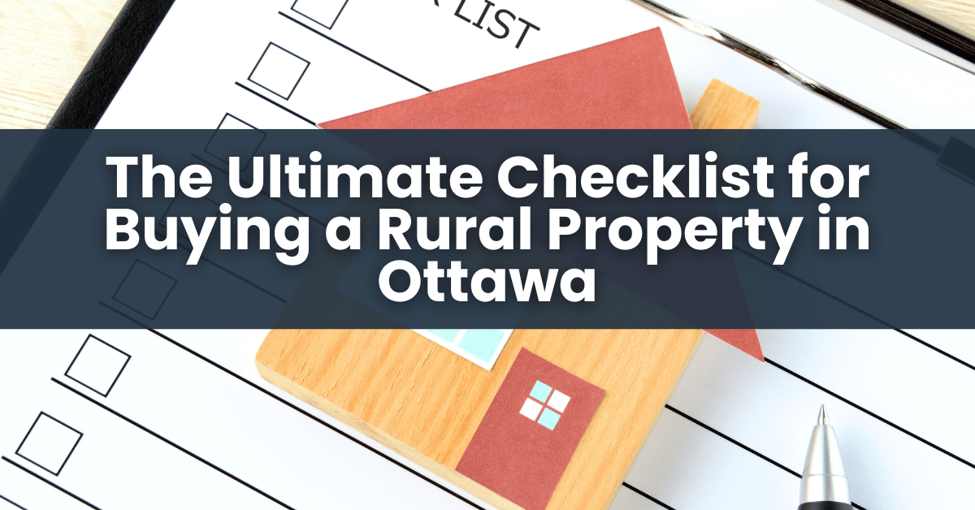Dreaming of wide open space, peaceful surroundings, and quiet evenings under the stars? You’re not alone. More and more buyers in Ottawa are making the shift from traditional suburbs to rural communities in search of space, privacy, and a slower pace of life. Whether you’re looking at Greely, Manotick, North Gower, or another community south of the city, buying rural can be a great lifestyle move — but it comes with some key differences from buying in the city that you need to be aware of.
In this blog, we’ll walk through everything you should consider before buying a rural home in Ottawa — from well water to septic systems, zoning, internet access, and long-term costs. This is your complete guide to making an informed rural purchase.
What Defines a Rural Property in Ottawa?
In real estate, rural properties in Ottawa are generally those that sit outside the city’s suburban boundaries and are not connected to municipal services like city water or sewer. These homes typically sit on large lots (often half an acre or more), use well and septic systems, and are governed by unique zoning rules. You’ll also find fewer sidewalks, more trees, and a much quieter environment. Popular rural areas include Greely, North Gower, Manotick, Osgoode, and Kars — each with their own mix of estate homes, bungalows, and custom builds.
Wells and Water Supply: What You Need to Know
Unlike city homes, rural properties typically rely on a well for their water supply. Most commonly, this will be a drilled well, which can provide clean and reliable water — but you’ll want to do your due diligence. A water quality test is essential, and most lenders will require it. You’ll also want to ask about the flow rate (measured in gallons per minute) to ensure it’s strong enough for daily use. Some homes may also have water filtration or UV systems installed, which is a great bonus — but be sure to factor in annual maintenance costs.
Septic Systems: Don’t Forget What’s Underground
When it comes to rural living, what’s under the ground matters just as much as what’s above it. A septic system handles all of the home’s wastewater, so you’ll want to know its age, service history, and condition. During your conditional period, arrange for a septic inspection and ask for any available pump-out records. Replacement systems can cost $35,000 to $50,000 or more, so knowing where the system is located and how well it’s working is key. Keep in mind that driving or parking on the septic bed can damage the system — something to be mindful of if you’re planning on hosting large gatherings or using heavy equipment.
Zoning and Future Plans
Just because you have a large property doesn’t mean you can build whatever you like. Rural zoning in Ottawa is governed by specific designations such as RU (Rural Countryside), AG (Agricultural), or VM (Village Mixed-Use). If you’re thinking about starting a hobby farm, running a home-based business, or building a detached garage or workshop, you’ll want to confirm that the property’s zoning allows it. A quick check with your Realtor or the City of Ottawa’s planning department can help you avoid costly surprises.
Internet and Cell Service: Ask, Don’t Assume
High-speed internet access isn’t guaranteed in all rural areas, though the good news is that many parts of Greely, Manotick, and North Gower are now serviced by Bell Fibe or other high-speed providers. That said, coverage varies block by block, so it’s worth asking the current owners about their setup and testing speeds if possible. If you work remotely or run a business from home, this can be a dealbreaker.
Heating and Utilities: Budget Realistically
Heating systems in rural homes can vary widely. Some use propane or oil furnaces, while others rely on electric baseboards, wood stoves, or pellet stoves. These systems can all be effective, but costs vary based on insulation, age of the home, and energy rates. Always ask for a 12-month average of utility bills so you can budget appropriately. Also, keep in mind that some rural properties have above-ground hydro lines and are slightly more prone to outages during storms.
Driveway and Road Maintenance
Long private driveways can be a perk — but they also mean more work. You’ll need to consider snow removal in the winter and gravel upkeep in the spring and fall. If the road leading to the home is privately maintained or shared with neighbours, ask if there’s a formal agreement in place and who is responsible for maintenance. Some rural properties don’t receive city plowing, which means you’ll need to arrange for a private contractor.
Emergency Access and Insurance
Being further from hospitals, fire stations, or hydrants may influence your home insurance premiums. It’s worth checking with your provider to see how location affects your coverage. Some homes may fall outside the recommended radius for certain fire insurance policies, especially if there are no nearby hydrants or if the fire hall is volunteer-based.
Is Rural Living Right for You?
There’s no denying the appeal of rural life: wide open space, privacy, peaceful surroundings, and a real sense of connection to the land. But with that comes more personal responsibility, a bit more planning, and a need to stay on top of maintenance. If you’re comfortable with those trade-offs, the rewards can be tremendous.
As someone who lives and works in the south end, I can confidently say rural living in communities like Greely and North Gower offers an unbeatable blend of lifestyle and long-term value — especially if you’re willing to get to know your land a little better.
Ready to Explore Rural Ottawa?
If you’re thinking about buying a home on a larger lot or outside the suburbs, I’d love to help you get started. Whether it’s answering your zoning questions, booking a showing, or connecting you to a great well/septic inspector — I’m happy to guide you through it.

